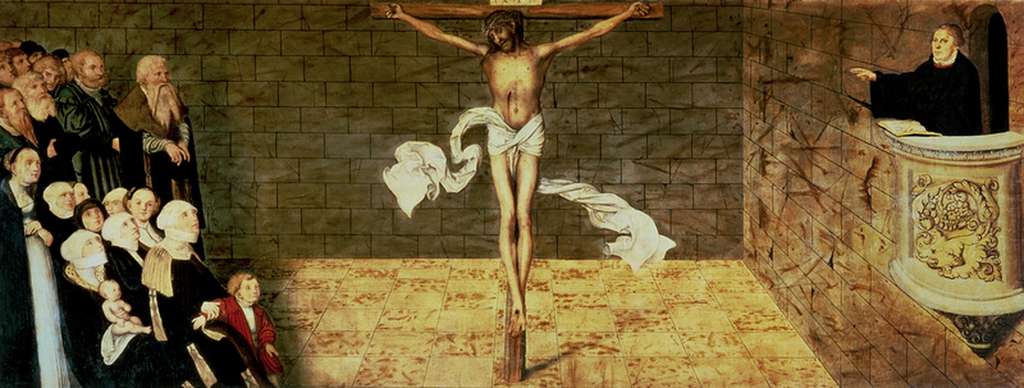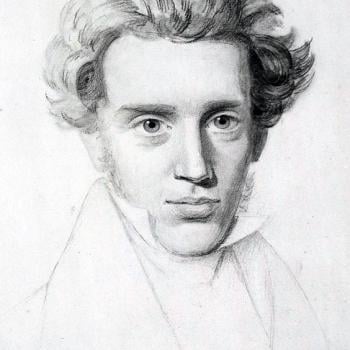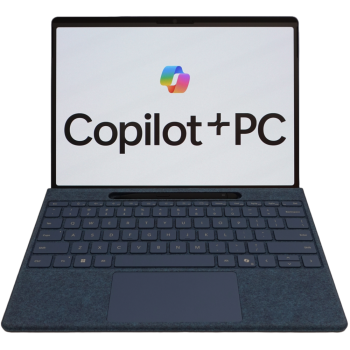Yesterday we blogged about the ethical problems involved when pastors use AI to write their sermons for them. We closed with this, quoting a woman on the clergy roster of the ELCA:
“Why not, why can’t, and why wouldn’t the Holy Spirit work through AI?”
I said that this illustrates the most important reason AI sermons are problematic. The major issue is not ethics but theology.
That quotation asking why couldn’t the Holy Spirit work through AI reminded me of Luther’s comment about the omnipresence of Christ:
Although he is present in all creatures, and I might find him in stone, in fire, in water, or even in a rope, for he certainly is there, yet he does not wish that I seek him there apart from the Word, and cast myself into the fire or the water, or hang myself on the rope. He is present everywhere, but he does not wish that you grope for him everywhere.
[The Sacrament of the Body and Blood of Christ—Against the Fanatics, LW 36:342.]
We should look for Christ where He tells us to find Him. Namely, in the Word and the Sacraments. And, I would add, we do so through the ministry of a pastor.
In the confession and absolution that are part of the Lutheran Divine Service, after we confess our sins, the pastor says this:
Upon this your confession, I, by virtue of my office, as a called and ordained servant of the Word, announce the grace of God unto all of you, and in the stead and by the command of my Lord Jesus Christ I forgive you all your sins in the name of the Father and of the + Son and of the Holy Spirit.
He has the office and the authority to do this because he is “a called and ordained servant of the Word.” According to the doctrine of vocation, God works through human beings to bring His gifts to other human beings. He creates children through the vocation of mothers and fathers; He gives us our daily bread through the vocation of farmers and bakers; He protects us by means of the vocation of lawful authorities; He heals us by means of the medical professions. And He baptizes us, gives us Christ’s body and blood, and forgives our sins by means of the vocation of the pastoral office.
God works through pastors whom He has “called and ordained,” thus empowering them to be “servants of the Word,” a service also carried out by preaching and other kinds of pastoral care. The Holy Spirit indeed works through the human pastor whom God has called to this work.
So the big question for ChatGPT being used to write sermons that are then preached from the pulpit is simple: Has ChatGPT been called by God to do that? Has the congregation called AI to be its preacher? Does AI have a pastoral vocation?
OK, I am approaching this through the Lutheran perspective on the pastoral office, but I think the point applies for all Christian traditions. Baptists don’t have such a high view, but they do emphasize being “called” to preach. So do Pentecostals. Has AI been called to preach? Since it is not a person, has no consciousness, and no spiritual identity upon which the Holy Spirit can work, it surely has not been called by the Holy Spirit.
Let’s look at the question from a different angle, from the perspective of what goes into a sermon. As I understand it, one thing that pastors generally do in preparing a sermon is to pray, to ask God to help them to say what their people need to hear. Does AI pray?
Luther said that three things are needed to create a true theologian, and, by extension, a pastor, who is the theologian to his flock: prayer (oratio), meditation (meditatio), and trial (tentatio).
We have established that AI doesn’t pray. Does AI meditate on God’s Word? It spits out information from an algorithm applied to a large language model, but, unlike a pastor preparing a sermon, it doesn’t meditate.
Tentatio has an array of meanings, corresponding to the German word Anfechtungen: trial, testing, temptation, struggle, spiritual warfare against the devil. A theologian, a pastor, should have experienced the kinds of spiritual trials and tribulations that the people in his congregation go through, so that he can effectively minister to them. AI knows nothing of human struggles or of any kind of human experience.
I conclude that an AI chatbot is not qualified to be a pastor. Therefore it should not preach. AI does not have this or any other vocation.
Illustration: Martin Luther Preaching by Lucas Cranach the Younger (1547), Reformation Altar in St. Mary’s Church via Picryl, Public domain/













